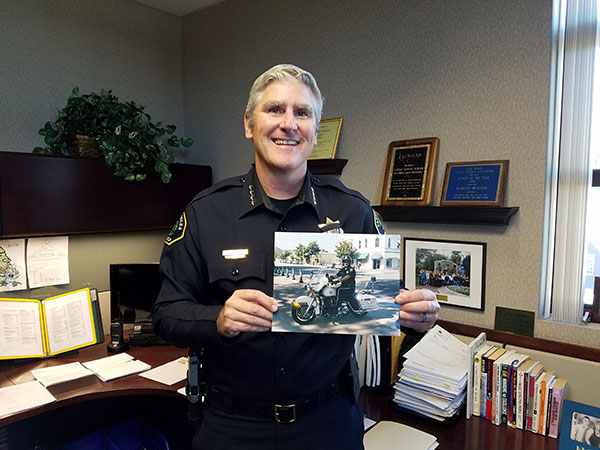Police chief Robert Burton celebrates 20 years on the job

Paso Robles Police Chief Robert Burton and his younger motorcycle persona. Photo by Jordan Elgrably
Gang crime rates are at their lowest since police chief came aboard
—Police Chief Robert Burton just celebrated 20 years on the force, and he recently sat down with Paso Robles Daily News for a chat to talk about what’s going right in Paso Robles. A native of San Luis Obispo County, Paso Robles promoted him to the top law enforcement slot three years ago to replace former Police Chief Lisa Solomon, who resigned under scrutiny in 2012.
When he came in, Burton said he wanted to focus on Paso Robles’ gang problem. According to a study authored by Paso Robles Police Lieutenant Ty Lewis, dated October 2016, gang activity in the Paso Robles region has declined steadily since 2013, with 213 documented gang members, according to police. Only one gang case was filed by the Paso Robles district attorney in 2016. The drop in gang activity is credited in part to the efforts of the Special Enforcement Team (SET), which works in tandem with a similar Atascadero Police Department team and with the local Sheriff’s Gang Unit.
There’s no question that Paso Robles is doing well when it comes to major crime. After all, in the last ten years the city has seen only six homicides, with the last occurring in 2013, and there have been zero officer-involved shootings over the past decade.
Burton has served as a patrol officer, motorized traffic officer, and a sergeant supervising both the patrol and detectives units. He then moved up to serve as a police lieutenant and captain, before serving as acting chief of police in 2012, and finally landed as chief in 2013.
While Burton had a thing for motorcycles, and still keeps a copy of Robert Pirsig’s classic Zen and the Art of Motorcycle Maintenance on his office bookshelf, he says he didn’t always want to be a cop.
Not long after graduating from San Luis Obispo High, Burton decided to major in applied arts and graphic communication at Cal Poly. His parents had urged him to choose between getting a job and getting out of the house, or going to college. A week after he graduated, he landed a job at a label manufacturing company in Fresno.
“I went over to Fresno, got a job in my major but I grew up in San Luis Obispo,” Burton recalled. “I was out of sorts a bit, I don’t think I liked Fresno. I had gotten married to my wife, Stacia, while over there, and we were searching for a way to get back to the Central Coast…This was in the early ’90s and the economy wasn’t very good, so there weren’t a lot of jobs to be had. An acquaintance of my wife who worked in law enforcement said you should check into this, it’s interesting, it’s fun, you’re outside, you’re not stuck in the office, there’s always something going on. I did my due diligence, looked into it, and it looked really exciting. That was 1996.
So you grew into a law enforcement career and have gone up the ladder. Any regrets?
No, none. It’s really been a fascinating career, it’s been challenging and rewarding. The city has been great to work for.
Do you think that your job has influenced or changed your politics? Has doing this job made you see the world differently?
Sure it has. There are certain laws that are crafted from either a liberal or conservative standpoint and when you’re in the law enforcement arena and you are concerned with things that have to do with public safety, such as drug addiction and all the things you see that can tear up a community, you can lean one way or another… I’ve never been extremely political. My father was a professor at Cal Poly, he definitely embraced a more liberal point of view. Through my growth in this profession I’ve probably become a little bit more conservative, in areas that I feel are more beneficial to the community in terms of keeping it safe, where maybe a liberal standpoint would be, yeah, make marijuana recreational.
I see the consequences. People say look at alcohol, it’s no worse than marijuana. Well, alcohol has really seemed to fail us in many respects. Some people can control the amount of alcohol they drink, but the majority of the service calls that we go on and the majority of the people we arrest, alcohol or drugs are almost always a factor, whether it’s domestic violence or they’re stealing because they have a drug addition, or they’re drunk driving. As far as the majority of arrests go, there’s some sort of intoxicant involved.
Atascadero’s Chief Jerel Haley explained why he was opposed to Pro. 47, and argues that Prop. 64 could present a challenge to law enforcement. When you came in as chief you said the two things you most wanted to focus on were drug abuse and gangs. Is Paso Robles safe?
I would say that we’re very similar to Atascadero in that we do have gang members who live here. Our incidents of gang violence have decreased over the last three or four years, and I think that can certainly be attributed to the formation of our special enforcement team that addresses both gangs and drug issues. And I think—you’ll hear it from the sheriff’s department and Chief Haley and anybody else—we’re basically surrounded by Monterey County, Santa Barbara County, we have Salinas, King City and all those folks up north, and then to the south of us we have Santa Maria and then to the east of us we have the bigger cities like Fresno…We’re in an area where we have gang influences but we don’t have such a significant issue that we’ve lost control.
When we’re doing our jobs, Paso Robles is a safe place to live.
Tell us briefly about your community policing efforts, outside of the Nextdoor website, and how Paso Roblans can get involved in making the city safer.
We spearheaded a community outreach program last year, Police And Community Together (PACT), which was built to promote community, government and police partnerships, implement proactive problem solving, and enhance the Department’s engagement with our community. The goal for PACT is to maximize our working relationship with the community that will, in turn, result in improved police service.
As part of the PACT program, PRPD has divided the city into four areas. A patrol sergeant has been assigned to each of these four areas. The sergeant will be a point of contact and act as a liaison between the community and the police department.
We also have our Police Activity League (PAL) that connects the department with the youth of our community. Each summer, PAL runs a Jr. Giants Baseball program that is a “cost-free,” coach-pitch league utilizing a pitching machine. All necessary equipment for play is provided by Paso Robles PAL, San Francisco Giants Baseball and ATEC Athletic Training Equipment. Police officers volunteer their time to work with the kids during this program.
Are there plans are underway to expand the number of active-duty officers?
We are currently allotted 34 sworn officers. Right now we have three vacant police officer spots and we just completed a recruitment to sponsor officers through the police academy. In addition, the City Council through the budget process has allowed us to over-hire by 2 police officer positions due to pending police officer retirements next year. This means we will be sponsoring five police officer recruits through the police academy in January.
Is there anything further you’d like to share with our readers?
The key to a successful police department is a strong connection with the community. Without continued help by the community to report crimes, help identify suspects, and let us know where they see problems, we will not reach our full potential as a community and police department.
Comments
The news staff of the Paso Robles Daily News wrote or edited this story from local contributors and press releases. The news staff can be reached at info@pasoroblesdailynews.com.





















